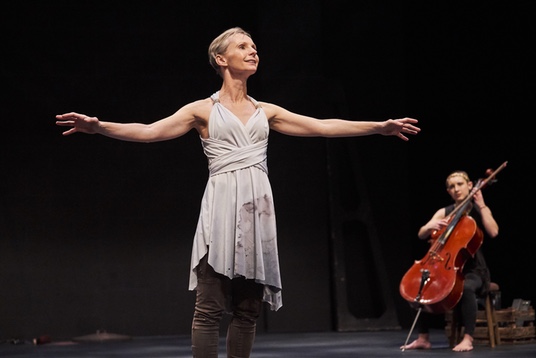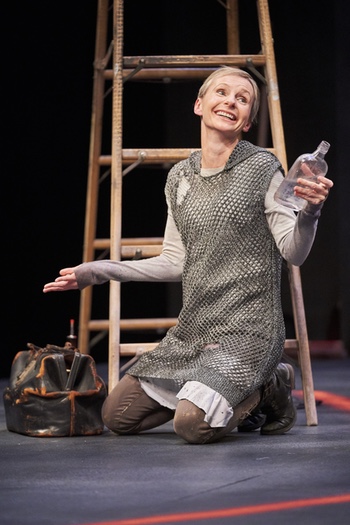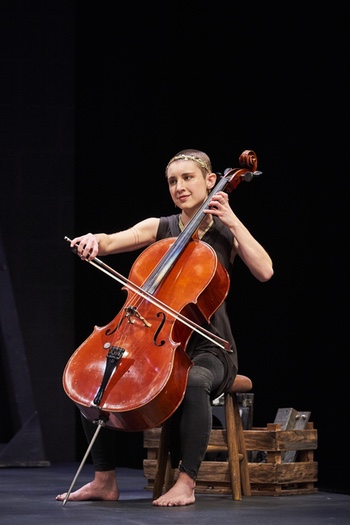
Through Sun 2/10
We all read the Iliad in high school or college but apparently we can’t get enough because the Bronze Age epic keeps popping up in contemporary discourse. New translations, new audiobooks and learned commentary. Sword and sandal movie versions. And lots and lots of plot summaries — CliffsNotes, GradeSaver, and Shmoop — each promising to get you through the required course work. After 2,500 years, new insights about the Iliad are hard to come by. And, given its many characters and narrative twists, a summary that’s both succinct and accurate is hard to find.
On Friday we went to the Cleveland Play House production of An Iliad. It is at once the unlikeliest and the best dramatization of Homer’s song that we’ve ever seen. “Unlikely” because the entire production consists of two women on a bare stage. The “best” because in only 100 riveting minutes it provides fresh insights, a vivid and relevant dramatization, and a nearly complete recap of the 150,000 word epic. Let us tell you about An Iliad, dear reader. Spoilers abound.
Admittedly, the stage was not completely bare. Against one wall there’s a push broom, a dust pan and a battered trash can. A 12-foot ladder stands center stage right. A low stool sits upstage left. The Outcalt Theatre is set up with steeply raked bleachers on three sides of the stage, making for excellent sight lines.
Tarah Flanagan, The Poet, enters by walking down through the bleachers. A slight woman, she carries a battered Gladstone bag and wears what looks like a World War I aviator’s helmet with goggles and a knee-length shift that resembles chain mail.

She begins to speak what is apparently Greek but lapses into English with Homer’s invocation (“Sing to me now, muses!”) and proceeds to set the scene. For the stone ramparts of Troy she draws a thick orange chalk line. She climbs the ladder — the ramparts — looks out to sea, and begins to name the ships and men of the Greek vanguard but then breaks off and addresses us directly. “You don’t know any of those places,” she says, and adds, “The point is on all these ships are boys from every small town in Ohio, from farmlands, from fishing villages, the boys of Nebraska and South Dakota, the twangy boys of Memphis, the boys of San Diego, Palo Alto, Berkeley, Antelope Valley.” Thus she collapses the distance between our time and Homer’s.
Flanagan breezily explains that of the 95 speaking roles in the Iliad, only three or four characters on each side are important. Then she tells us in a matter-of-fact way who she’s speaking for. Agamemnon, the Greek commander in chief, lounges on the floor and speaks in a plummy English accent. When the Trojan hero Hector and his wife Andromache, speak to each other, she is distinguished by her one arm crooked to hold their infant son. Flanagan’s craft is considerable but it gives the audience an effortless ride through Homeric complexities.
Flanagan’s Poet is present and intimate like no classics professor ever. She elicits our participation in chants for Achilles, the Greek hero, and Hector. She sits in the bleachers with us. She rattles off long litanies of wars fought and cities destroyed from ancient times to the present. And she shows us her own human vulnerability and her emotional engagement.

Soon after our chants for Achilles vs Hector, Eva Rose Scholz-Carlson enters with her cello as The Muse. The program note tells us that she’s a high school senior and she looks her age, but she plays cello in An Iliad like a seasoned theater professional, never stepping on Flanagan’s lines, always coloring each pause in the soundscape.
The soundscape of An Iliad consists of Flanagan’s voice, Scholz-Carlson’s cello and one loud crash. As the narrative winds down to the destruction of Troy, Flanagan mentions and dismisses the Trojan Horse, muttering “I’m not singing that song” as she uses the push broom to sweep all the chalk into a little pile, into the dust pan and into the trash can. “Crash!” goes the lid on the trash can, the loudest sound in the 100 minute soundscape. Another city destroyed in war.
Playwrights Lisa Peterson and Denis O’Hare began collaborating on An Iliad in 2006, working from the text of Robert Fagles’ translation. After many developmental workshops and many different productions, An Iliad deservedly won the 2012 Obie and the Lucille Lortel awards.
An Iliad is at the Outcalt Theatre at Playhouse Square through Sunday 2/10. Tickets are $25-$97. For tickets or more information go to Clevelandplayhousesquare or phone 216-241-6000.
[Written by Elsa Johnson and Victor Lucas]
